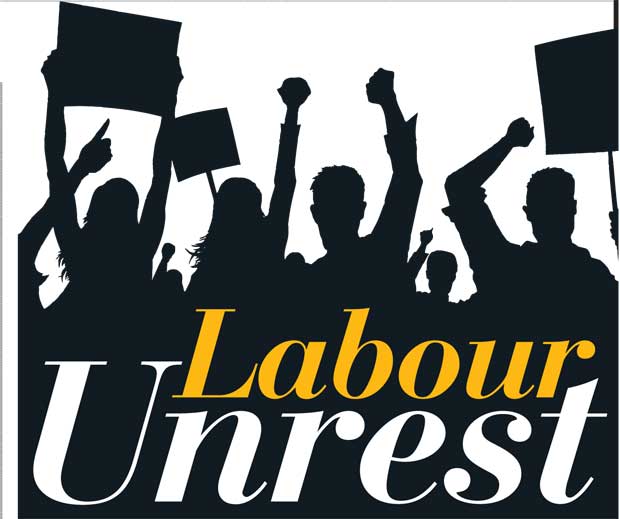Labour Unrest
How do we respond to the recent railway union strike? Was it about higher salaries and administrative grades of railway workers? Or, was it a disruption of public transport? I argue that such strikes prod us to think about workers’ rights in a democracy.
The railway strike was not an aberration. Over the last couple of years, we have witnessed an  increasing number of agitations and protests - student unions opposing privatisation of education, plantation workers struggling for higher wages and telecom workers demanding permanent employment are some of those major mobilisations. The accusation that all these strikes and protests are politically engineered attempts to topple the Government by the remnants of the Rajapaksa regime do not hold much water given their widespread and different character. Rather, these waves of strikes and protests reflect the failure of economic policies to speak to their basic concerns and their deteriorating economic life.
increasing number of agitations and protests - student unions opposing privatisation of education, plantation workers struggling for higher wages and telecom workers demanding permanent employment are some of those major mobilisations. The accusation that all these strikes and protests are politically engineered attempts to topple the Government by the remnants of the Rajapaksa regime do not hold much water given their widespread and different character. Rather, these waves of strikes and protests reflect the failure of economic policies to speak to their basic concerns and their deteriorating economic life.
 increasing number of agitations and protests - student unions opposing privatisation of education, plantation workers struggling for higher wages and telecom workers demanding permanent employment are some of those major mobilisations. The accusation that all these strikes and protests are politically engineered attempts to topple the Government by the remnants of the Rajapaksa regime do not hold much water given their widespread and different character. Rather, these waves of strikes and protests reflect the failure of economic policies to speak to their basic concerns and their deteriorating economic life.
increasing number of agitations and protests - student unions opposing privatisation of education, plantation workers struggling for higher wages and telecom workers demanding permanent employment are some of those major mobilisations. The accusation that all these strikes and protests are politically engineered attempts to topple the Government by the remnants of the Rajapaksa regime do not hold much water given their widespread and different character. Rather, these waves of strikes and protests reflect the failure of economic policies to speak to their basic concerns and their deteriorating economic life.
Trade unions
Historically in Sri Lanka, as in most other countries, trade unions have been important for ensuring decent wages and working conditions. In addition to fighting for workers’ rights in the capitalist system, which is dependent on exploiting workers, trade unions are often central to the defence of democratic rights. Drawing from our own history, trade unions were at the forefront of the anti-colonial struggle. Ensuring that the government does not infringe upon freedoms of expression and association is a key, recurring challenge in democracies and often, trade unions are central to asserting these rights.
Given that the power of the trade unions movement depends on its organisational strength, it is important to consider the obstacles that have emerged in the recent decades. Laws that stipulate how a trade union can be formed to have tightened, the Labour Department responsible for trade unions functions more like an “employers’ department” and the division of workers into permanent workers and contract or commonly called “manpower” workers has led to unprecedented insecurity and precariousness of workers, inhibiting them from participating in trade union activity. It is in such a stifling environment that trade unions try to organise workers and negotiate
with employers.
Given that the power of the trade unions movement depends on its organisational strength, it is important to consider the obstacles that have emerged in the recent decades. Laws that stipulate how a trade union can be formed to have tightened, the Labour Department responsible for trade unions functions more like an “employers’ department” and the division of workers into permanent workers and contract or commonly called “manpower” workers has led to unprecedented insecurity and precariousness of workers, inhibiting them from participating in trade union activity. It is in such a stifling environment that trade unions try to organise workers and negotiate
with employers.
"The JO has been crassly opportunistic and only concerned about cheap shots at the Govt. The formal opposition TNA has been virtually asleep on economic issues and mainly toed the Govt line when it comes to workers concerns"
The persistent attack by employers and the state on workers pose a major challenge to unions, leaving unions with few options, including strike action as the last resort. Strikes are a disruption, and are intended to halt economic activities, when employers and the state are unwilling to negotiate with the trade unions. However, strikes are a risky course of action for trade unions and their worker membership, because the failure of such escalated and collective action can also cost the workers their jobs.
When strikes are launched, the government in turn responds by delegitimising and, when possible, crushing trade unions. The government drags decision-making, and meanwhile threatens workers with dismissal, all this backed dutifully by an anti-union media propaganda, until public sentiment turns against the workers. Therefore, the mobilisations and pronouncements on both sides of the divide, with the trade unions and the Government in the case of the railway strike, become an ideological battle to win the support of the public.
crushing trade unions. The government drags decision-making, and meanwhile threatens workers with dismissal, all this backed dutifully by an anti-union media propaganda, until public sentiment turns against the workers. Therefore, the mobilisations and pronouncements on both sides of the divide, with the trade unions and the Government in the case of the railway strike, become an ideological battle to win the support of the public.
In this context, the trade union movement as a whole needs to recognise its shortcomings. Whether in the West or in Sri Lanka, trade unions have excluded women and other marginalised groups in their organising work and leadership. Therefore, trade unions have to broaden themselves to take up the concerns of working women, informal workers and rural people’s livelihoods. Furthermore, if trade unions are to reclaim their democratic vision and role, they must reject outright nationalism and majoritarianism, which are the bane of any just society.
When strikes are launched, the government in turn responds by delegitimising and, when possible,
 crushing trade unions. The government drags decision-making, and meanwhile threatens workers with dismissal, all this backed dutifully by an anti-union media propaganda, until public sentiment turns against the workers. Therefore, the mobilisations and pronouncements on both sides of the divide, with the trade unions and the Government in the case of the railway strike, become an ideological battle to win the support of the public.
crushing trade unions. The government drags decision-making, and meanwhile threatens workers with dismissal, all this backed dutifully by an anti-union media propaganda, until public sentiment turns against the workers. Therefore, the mobilisations and pronouncements on both sides of the divide, with the trade unions and the Government in the case of the railway strike, become an ideological battle to win the support of the public. In this context, the trade union movement as a whole needs to recognise its shortcomings. Whether in the West or in Sri Lanka, trade unions have excluded women and other marginalised groups in their organising work and leadership. Therefore, trade unions have to broaden themselves to take up the concerns of working women, informal workers and rural people’s livelihoods. Furthermore, if trade unions are to reclaim their democratic vision and role, they must reject outright nationalism and majoritarianism, which are the bane of any just society.
State confrontation
The recent strikes in Sri Lanka have taken on the character of a confrontation with the state. This is a consequence of moves to privatise state-owned enterprises. There is considerable pressure from institutions such as the IMF and the World Bank to privatise state-owned enterprises, and state policies are now overtly
seeking privatisation.
The background to the railway strike are also moves towards the partial or complete privatisation of such state-owned enterprises. The irony of the gazette notification making railways an essential service during the strike, begs the question as to why any government would consider privatising an essential service? Furthermore, the Government and its elite propagandists claim strikes inconvenience – transport as with the railway strike – the working people in particular, even as they seek to privatise state services resulting in much higher costs to the public. Such contradictions reflect the hypocrisy and lack of vision on the part of the Government in addressing both workers concerns and services to the public.
seeking privatisation.
The background to the railway strike are also moves towards the partial or complete privatisation of such state-owned enterprises. The irony of the gazette notification making railways an essential service during the strike, begs the question as to why any government would consider privatising an essential service? Furthermore, the Government and its elite propagandists claim strikes inconvenience – transport as with the railway strike – the working people in particular, even as they seek to privatise state services resulting in much higher costs to the public. Such contradictions reflect the hypocrisy and lack of vision on the part of the Government in addressing both workers concerns and services to the public.
"Given that the power of the trade unions movement depends on its organisational strength, it is important to consider the obstacles that emerged in the recent decades"
Such contradictions are also seen in moves of some unions. While the GMOA over the last two years is seeking to position itself as a champion of trade union rights, it remains committed to the private practice of its doctors through channelling in large private hospitals and work in private clinics. The growth of the private healthcare industry through such means is continuing to undermine free healthcare to the public.
There is another reason for the increasing number of strikes and protests in recent times in relation to state policies. It is not just the problematic stance of the Government, there has also been little effective advocacy much less alternatives from opposition forces in Parliament. The Joint Opposition has been crassly opportunistic and only concerned about cheap shots at the Government. The formal opposition TNA has been virtually asleep on economic issues and mainly toed the Government line when it comes to workers concerns.
Thus, a lack of meaningful debate and airing of issues and alternatives have meant trade unions and peoples’ movements have no choice but to escalate their problems through strikes and protests. They try to gain the attention of the public as means of engaging the Government. In this context, the Government sometimes resorts to violence including teargas and police or even military action to break the protests.
There is another reason for the increasing number of strikes and protests in recent times in relation to state policies. It is not just the problematic stance of the Government, there has also been little effective advocacy much less alternatives from opposition forces in Parliament. The Joint Opposition has been crassly opportunistic and only concerned about cheap shots at the Government. The formal opposition TNA has been virtually asleep on economic issues and mainly toed the Government line when it comes to workers concerns.
Thus, a lack of meaningful debate and airing of issues and alternatives have meant trade unions and peoples’ movements have no choice but to escalate their problems through strikes and protests. They try to gain the attention of the public as means of engaging the Government. In this context, the Government sometimes resorts to violence including teargas and police or even military action to break the protests.
Capitalist exploitation
While the recent strikes in our country are mainly seen as a confrontation among trade unions and the Government, the long history of strikes globally points to a less apparent and powerful underlying process of conflict between capital and labour. One of the most profound works on the history of labour and trade unions in recent times is Beverly Silver’s Forces of Labour: Workers’ Movements and Globalization since 1870 (Cambridge University Press 2003). Silver and a large research team working for close to two decades looked at data spanning over a century from 1870 to 1996 on the frequency of labour unrest, defined as strikes, demonstrations, factory occupations, food riots etc., in 168 countries. What they found is that with increasing exploitation of capital in different parts of the world at different time periods, labour unrest also increased. Their conclusion points to the contradictions and conflicts between capital and labour as central to frequency
of strikes.
of strikes.
"When strikes are launched, the government in turn responds by delegitimising and, where possible, crushing trade unions. The government drags decision-making, and meanwhile threatens workers with dismissal"
Such international research on workers’ struggles should also be instructive for us to understand our context in Sri Lanka. That would mean understanding strikes not just as political manoeuvres or confrontation with the state, but as the historical outcome of increasing exploitation, precarious employment and dispossession, which characterise the social and economic life of our people. In other words, no matter how much the elite and sections of the middle class, moan and groan about the disruption to public life by strikes, unless we are willing to find and invest in equitable and socially just economic alternatives, such labour unrest is likely to continue. The major task before trade unions and those committed to social justice is to channel labour unrest towards economic democracy.

